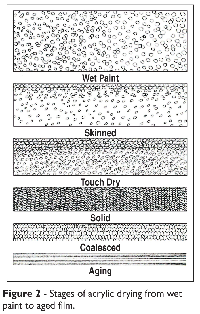Last Updated on March 12, 2024 by Masha Eretnova
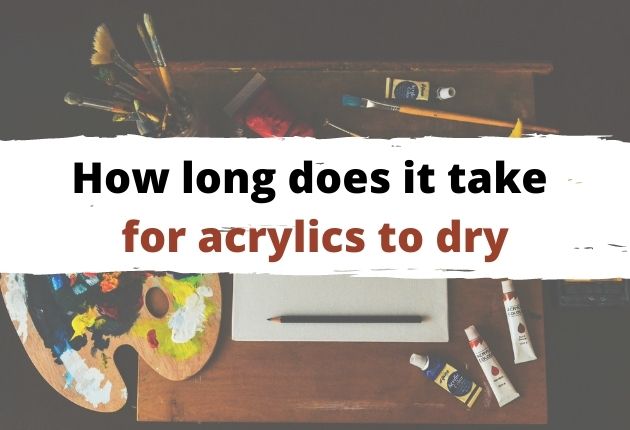
One of the beauties of acrylics is how fast they dry and how fast we can enjoy the results.
I think this is the best thing ever for beginners, boom… and your painting is dried and amazing.
Acrylic paint is fast-drying and a thin acrylic paint layer will dry in 10-30 minutes, while a thick acrylic paint layer can take up to 2 hours to dry to the touch.
Acrylic painting will fully cure in about 24 hrs.
How long acrylic paint will dry fully depends on the temperature, humidity, paint type, thickness of layers, and some other factors.
There are also some slow and fast-drying techniques and mediums.
I suggest you read my post to deeply understand the drying process, and its stages and find out 20 popular brands’ dry times.
Also, I share easy and almost free methods to make acrylic dry slower or faster.
Table of Contents
This article contains affiliate links. It means no extra cost for you but a little commission (2-3%) for me to support my hobby and blog. Thank you!
How long does it take for acrylic paint to dry?
The drying time of acrylic paint depends on paint grade, thickness of the layer, humidity, temperature and type of acrylics, but acrylics usually dry to touch in about 5 to 30 minutes. You can varnish an acrylic painting after 4-7 days.
When we ask about drying time, we should keep in mind that there is a difference between acrylic paint dried to touch and fully cured or dried paint.
Dry time, mentioned by brands, probably means “dry to touch”. When we read product sheets we will see a range of drying times for acrylic paint.
It takes artist-grade acrylic paint 10-30 minutes to dry between coats.
If you’re painting thick layers, using open acrylics, or in an inappropriate environment, it can take acrylic paint up to 1-2 hours to dry.
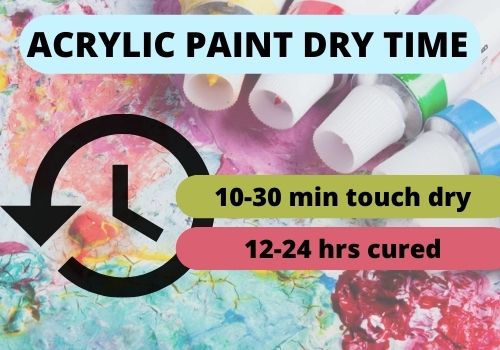
Acrylic paint is water-based. The paint composition defines the main characteristics of the acrylics and the drying time of the paint.
Understanding acrylic paint drying times
Acrylic paint is made of:
- pigments that give color to paints
- binder (polymer) that assures waterproofness, gloss, and fast and even drying
- water + binder – drying water evaporates and leaves a film
- other agents that provide durability.
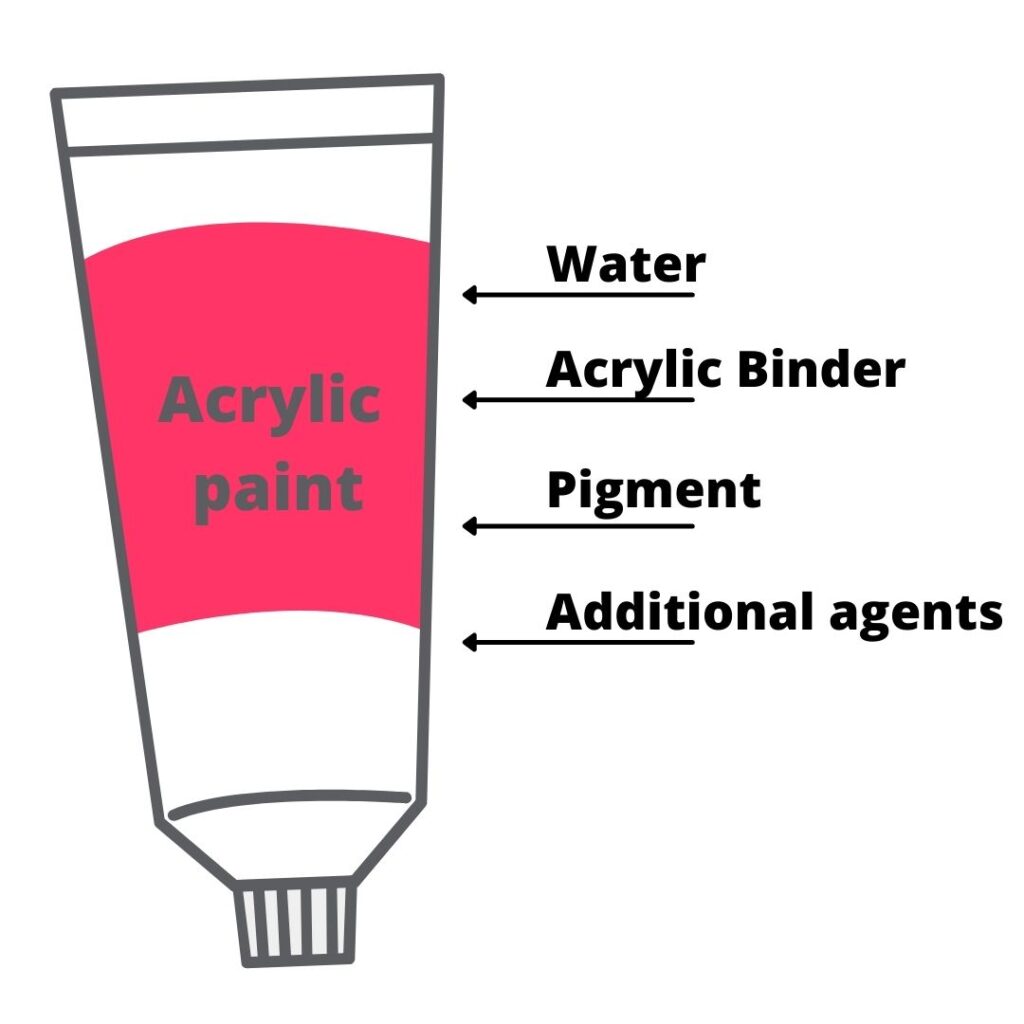
The process of acrylic paint drying is water molecules and some other agents’ evaporation. Binder and pigment stay and stick to each other.
In fact, there are 2 stages of drying acrylic paint:
- Fast dry stage – we call it dry to touch, it means a soft film has already formed on the top of the paint. This also means for us that water will no longer dilute the paint, but the paint is still sensitive to pressure. Still, it is not a full-dried painting.
- The second stage is when the whole paint body, even under the thin dried film, will dry. After this, the painting is completely dried or cured. The water evaporates completely during this stage. This is why the thickness of the paint will affect the drying time – all paint should be dried.
The visible difference between stages is almost non-existent. Consider time more than the visual aspect. Some brands will be darker when fully cured.
Tip from Tri-Art Manufacturer: touch the back of the painting support, if it is cold then there is still water left in the paint that needs to evaporate.It means it is still drying.
After this, acrylic paint starts its aging process. You can see how much water we have in wet paint and how it shrinks over-drying.
But…drying depends on several factors that can easily affect how fast or how slow acrylics dry. Some of them are:
- environment: temperature, humidity, airflow
- the paint quality and brand. There are some special products that dry slower or have options to stay open longer. We assume that students-grade paint dries faster and they are cheap, and artist-grade dries a bit slower. In practice, it is not always the case. But it is true that the quality of the paint will be different.
- the thickness of each layer: thin layer (1mm) will dry faster, thick layers (depending on how thick they are) can dry up to 1-2 hrs.
- what kind of palette do you use
- what kind of surface do you paint on
- if you use other mediums or water
- etc.
We will talk about each of them below.
To be sure you acrylic paint dries as fast or slow as you want, let’s learn how acrylics dry and how to influence the drying process to make it faster or slower.
What can affect how long acrylic paint dries?
As I already mentioned there are some important things influencing acrylic paint drying. First of all, we talk about the environment, quality, and choice of surface, paint, and mediums.
“Dry slow” for standard acrylic means to dry to touch slower than 30 minutes.
If you worry about it, please, check the full list of factors affecting acrylic paint drying and make your acrylic dry faster or wait a little bit and enjoy the finished painting.
Paint Thickness
The number of layers of paint, the right amount of time between all coats of paint, and the thickness of your paint can affect your good results.
You applied thick layers (more than 1 mm) and thick layers dry slower. Some brands say that a thick layer can stay wet for days! A thin layer of acrylic paint will dry faster.
For thick application, it is highly recommended to paint in thin layers of acrylic paint. Successive applications rather than applying one thick layer can offer the best results.
The first layer of color usually dries faster.
Surface
As we know, acrylic paint is good for many different surfaces. If your painting surface is glossy or non-absorbent at all, it means it is hard for paint to adhere to the surface.
Make sure you prime your surface and use appropriate supplies – good surface preparation means a lot for good results.
On the contrary, if you use unprimed wood or another absorbent (or unprimed) surface, it will soak all paint quickly and you will need more and more layers.
Unprimed paper is also generally more absorbent than pre-primed canvas. But unprimed canvas will be more absorbent than paper.
Read also: 11 Amazing Painting Surfaces for Acrylics: What Do You Use Acrylic Paint on?
Palettes
you use stay-wet palettes. It can be a homemade wet palette or from a shop. The main goal of these palettes is to keep your paint from drying.
Try to choose plastic or glass palettes if you don’t aim to slow your paint drying time.
Paint brand and quality
you use a brand of paint with a longer open time, such as Golden Open.
This paint stays wet for up to 1 hour. Or you use fluid acrylics with a thin application – this will dry faster.
Using a Medium
using any of these mediums: extenders, retarders, slow-dry medium, wetting spray. They are all made to make acrylics dry slower. Check the properties of the medium you use.
If you need one of these, check my 11 recommended slow-drying mediums.
Using Water
you are used to spraying the back of your canvas or paint while working. If so, acrylics are likely to dry slower than usual as much water remains on the surface.
you added too much water to the paint which slows down the evaporation process and damages paint quality. Thinning paint with water is something I don’t recommend: first of all, water dilutes pigment and binder and changes the bonding properties. Second, it slows down drying, because as we remember drying = evaporation.
Environment: Temperature, Air Flow and Relative Humidity
Environmental factors such as temperature changes, humidity level, direct sunlight, air circulation, use of air conditioners, and others impact the dry time of acrylic paint and pour paintings.
If you paint in high humidity (50%+), the temperature in your room is below 65F (18C) – and you will slow down the drying of acrylics. You paint in the warm and dry room – you make acrylic paint dry faster as high temperatures make the water evaporate faster.
The air flow can also affect the drying process. Using a fan can help. But do not place the fan or a heater directly in front of the painting. Heat plus increased airflow makes acrylics dry faster.
The ideal environment for acrylic painting:
Temperature: 65-75 degrees Fahrenheit (18 – 24 C).
Humidity level: 40-50%
Well-aired
After care
I used to cover your painting with plastic. It will keep moisture and slow down the drying process.’
If you think one or a couple of these factors may have a place, your paint is likely to dry slower. There is nothing wrong with it, just try to avoid it next time if you want quicker results.
There are some methods how to make your paint dry faster if you are not satisfied with the actual drying time. They are very simple and almost free.
I also share 15 methods to make acrylics dry slower below, you can save it for the future 🙂
I hope all your paintings dry as fast as you need!
Acrylic Paint Drying time by brand
Almost every paint brand posts on their website the full product sheet for paints and mediums. Usually, that sheet will provide you all the technical information you may need.
I will save your time and give you the full list of dry time by brand in the table below. I also provide links to official manufacturers websites where you can double check all the information or read further materials.
*I will mark N/A if the brand says nothing about dry time and the real testimonials differ. In that case, consider that the dry time is standard – 20-30 min. I’ve contacted brands that didn’t have such info like Plaid (Folk Art, Apple Barrel), Liquitex, Daler Rowney, etc, and they were kind enough to quickly reply.
Drying time of 30+ Acrylic Paints
| Brand | Drying time, min | Type of paint |
|---|---|---|
| Liquitex Basics | 5-10 (thin layer) with retarder 15 min max | student-grade, fast-drying |
| Liquitex Pro Heavy Body | 5-10 (thin layer) with retarder 15 min max | artist-grade, fast-drying |
| Liquitex Pro Soft Body | 5-10 (thin layer) with retarder 15 min max | artist-grade, fast-drying |
| Lascaux Artist | I assume 20-30 (brand doesn't mention it) | artist-grade |
| Utrecht | 10-20 (thin) up to 3 days (thick) | |
| Winsor & Newton Galeria | 10-20 (thin) 60 (thick) | student-grade |
| Winsor & Newton Professional | 20-30 1-2 hours (thick) | artist-grade |
| Pebeo AcrylColor | 5-30 | craft paint |
| Pebeo Pouring Experiences | 24 hrs | pouring |
| Pebeo Studio Acrylics | 30-60 min Curing 1-8 days | student-grade |
| Pebeo Extra Fine Artist Acrylics | 30-60 min Curing 1-8 days | artost-grade |
| Apple Barrel | 30 min (porous surface) up to 1.5 hr if pouring cure time up to 2 weeks | craft paint, fast-drying |
| Folk Art Texture Paint | 24 hrs curing 48-72 hrs | craft paint |
| Folk Art | 30 min (porous surface) cure time up to 2 weeks | craft paint |
| Craft Smart | 15 min | craft paint, fast-drying |
| Blick Studio | 15 min | student-grade |
| Blick Artists | 20-30 | artist-grade |
| Golden OPEN Acrylics | Stay wet 30-60 min. Touch dry 24+ h up to 14 days fo fully cured | artist-grade, slow-drying |
| Golden Heavy Body | Stay wet for less than 5 min. Touch dry for 30 minutes. | |
| Atelier Interactive | as long as you add the Unlocking formula without it 10-15 min | artist-grade, interactive paint with controlled drying |
| M Graham Acrylic | 10-20 | artist-grade |
| Matisse | N/A, assume 20-30 min | artist-grade |
| Sennelier Extra-Fine Artist Acrilique | 10-30 min | artist-grade, fast-drying |
| Sennelier Abstract Acrylic | 30 min | artist-grade, fast-drying |
| Daler-Rowney | 10-20 (thin layer) Curing 12 hrs | fast-drying |
| Amsterdam Expert Series | 30 min | artist-grade, fast-drying |
| Miameri | N/A, assume 20-30 min | fast-drying |
| Tri-Art | Thin layers - dry to the touch within a few minutes, thicker - several hours. | student-grade, fast-drying |
| Crayola | 10-30 min | craft paint, fast-drying |
| Holbein Heavy Body | Has longer working time, but no exact mention I assume it will be still up to 30 min | artist-grade, fast-drying |
| Arteza | 15 min | student-grade, fast-drying |
| Old Holland | "quick-drying", I assume 10-20 min | |
| Lukas Cryl Terzia | 30 | student-grade, fast-drying |
| Lukas Cryl Studio | 30-60 | artist-grade, fast-drying |
| Gamblin | 30-60 | |
| Grumbacher Academy | N/A, assume 20-30 min | student-grade |
| U.S. Art Supply Artists Acrylic | N/A, assume 20-30 min | student-grade, fast-drying |
| Castle Art Supplies | 10-30 | craft paint |
| Da Vinci Acrylics | N/A, assume 20-30 min | artist-grade, fast-drying |
| DecoArt Americana | N/A, assume 20-30 min | craft paint, fast-drying |
| Sargent Art | N/A, assume 20-30 min | craft paint, fast-drying |
| Mont Marte Acrylic paint | 20-30 min | student-grade, fast-drying |
| Hippie Crafter Acrylic paint | 20 min | pouring paint |
As you can see, the general dry time is about the same for all acrylic paint brand. I will say it again – the drying time is more sensitive to other factors than how it was made.
Sure, some manufacturers try to save our time and efforts and create paint and mediums for every case and technique we may want to use.
But, still, the temperature, the amount of water to dilute paint, humidity, type of mediums and surface you choose will play bigger role in drying process.
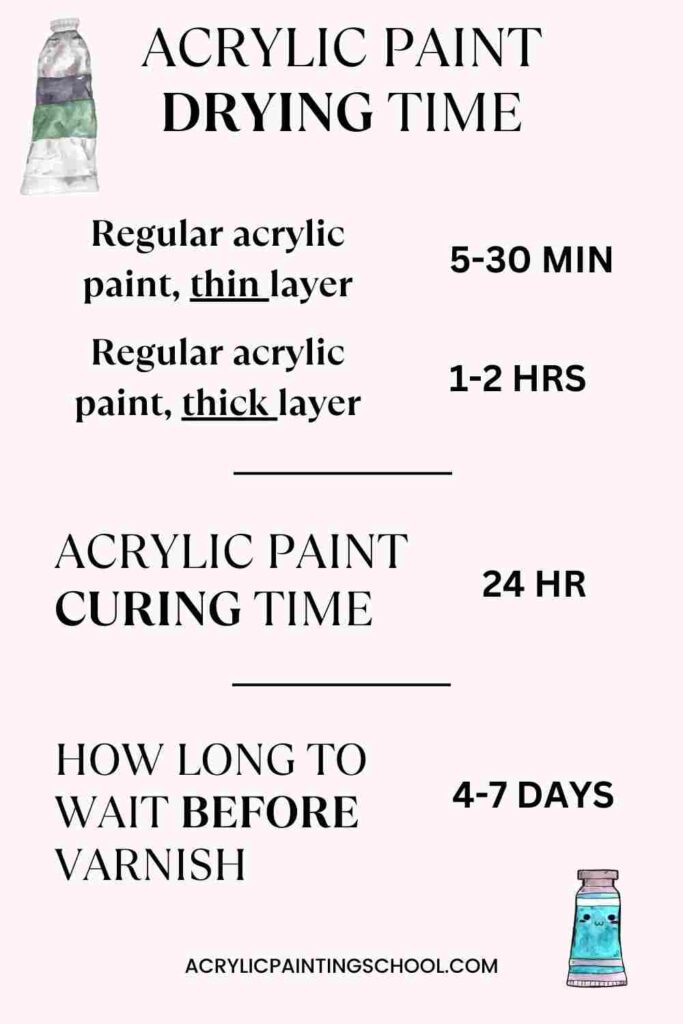
How to make acrylic paint dry faster
- Apply thin layers
- Paint in a warm room and dry environment
- Use a hairdryer or heater
- Use fast-drying paint
- Do not use these mediums
Need more information? Check the full post about How to make acrylics dry faster on my blog (it will be open in a new tab, don’t worry).
How to make acrylic paint dry slower
- Painting in the right environment: low humidity, cold weather
- Painting outdoor
- Using primed surface
- Moisturizing the back of the canvas
- Using a wet palette or a non-absorbent palette
- Spraying the palette with water
- Spraying the palette with wetting spray
- Use paint with a longer open time
- Use artist-grade acrylic paint
- Use paint retarders
- Using acrylic glazing liquids
- Thicker application
- Using plastic wrap after finishing
The best way to learn more about each method is to read the post Ways to Make Acrylic Paint Dry Slower
Slow-drying Acrylics: Golden Open drying time
The Golden Open Acrylics paint by Golden Artist Colors is the most slow-drying acrylic paint and stays open (workable) up to 1 hour.
Golden Open acrylic paint curing time is 30 days unlike regular acrylics that cure in around 4 to 7 days
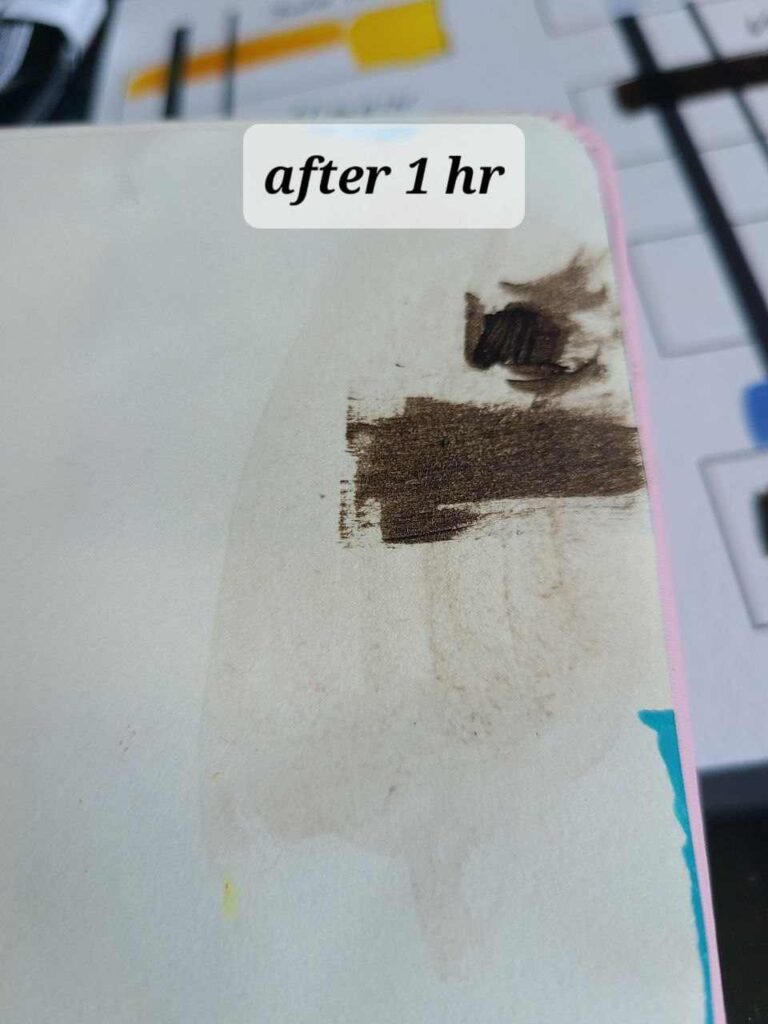
It means it will be still wet on the palette and you can continue painting. It happens because this paint already has some retarder in it.
I have to mention that Open acrylics can dry slightly lighter and less opaque than Heavy Body or other acrylics.
Remember that acrylic paint is fast-drying and some craft paint will dry to touch in as soon as 5 minutes while some professional paint can stay workable for up to hours.
Learning how to paint and control the paint is an amazing journey and I hope you’ve learned more today about acrylic paint drying time and how to alter it if needed!
How fast does your acrylic paint usually dries and what brand you use?
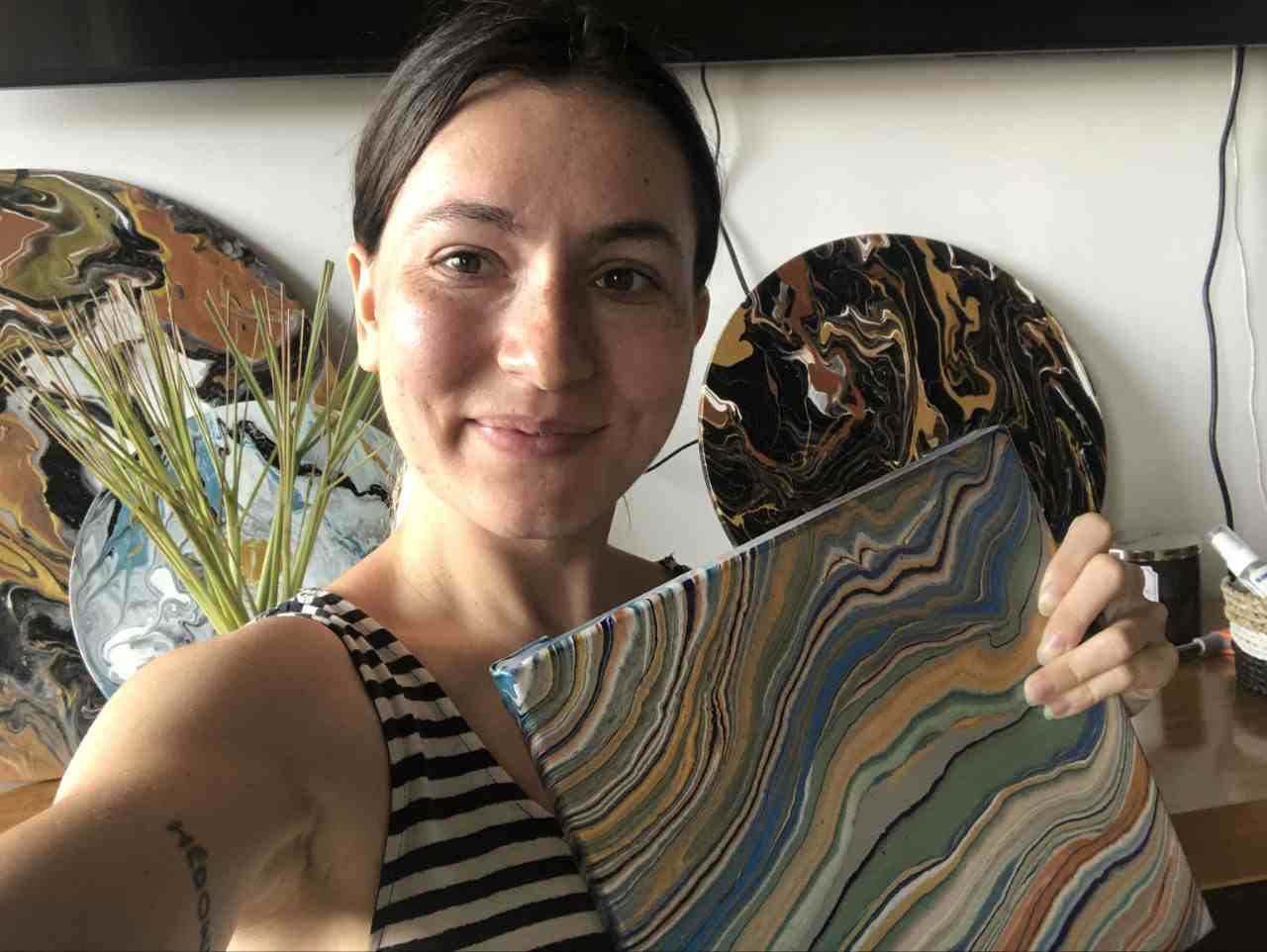
Masha Eretnova, born in 1991, is a Buenos Aires-based certified teacher, artist, and member of the Professional Artist Association with 20+ years of personal painting journey.
She started painting and drawing very early and is now an international abstract artist and educator passionate about acrylic painting, gouache, and crafts.
Her works are part of international exhibitions and contests, including ArtlyMix (Brazil), Al-Tiba 9 (Spain), Exhibizone (Canada), Italy, and many more.
Besides her artistic pursuits, Masha holds a post-grad diploma in Teaching Film Photography and 2 music school diplomas: piano and opera singing.
